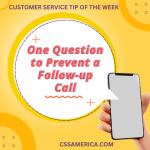I was speaking with one of my personal physicians years ago, and when we were talking about my work – particularly customer satisfaction research – he started talking about online physician ratings. He lamented that a few low ratings were dinging his overall score. Then he shared that the low ratings were often because his schedule was booked, and people cannot see him immediately. Sometimes it was a complaint that the scheduling person was not pleasant or the patient was on hold a long time trying to get the appointment set up. None of these low ratings was directly because of the doctor.
But there was one low rating where somebody commented that the physician was rude. When his staff followed up for clarification on the comment, the patient noted that the physician didn’t spend enough time with them and didn’t ask enough questions.
Now, I had been cared for by this physician long enough to never dream of calling him rude. He’s very personable, very efficient, and very knowledgeable. But there was something about that encounter with that other patient that gave the perception of the physician being rude.
Defining Rudeness
Different people perceive rudeness in different ways. In this case, rudeness was – in the mind of the customer – defined as the lack of time spent by the physician. For others, if you interrupt them, they feel you’re rude. For some, if you’re looking at your phone or iPad or computer while they’re in front of you, they think you’re rude. If the employee states only what can’t be done in response to a request, some view that as rude, even if it’s the truth. For some customers, 1-word answers from employees seem rude. And for others, a harsh tone – where the employee only seems to emphasize the negative words – seems rude.
Overcoming the Perception
For all we know, the employees in these situations are all very kind. Unfortunately, that particular customer engaged with them at that particular moment is perceiving them as rude. So how do we overcome that perception?
From a time perspective, yes, be quick, efficient, and productive, but also be patient with the customer and their questions. Don’t interrupt the other person, but instead let them share. Ensure you’re focusing more on the customer than on the device in front of you, and if you have to be looking at that device, let them know what you’re doing on their behalf while tapping the keys.
Complement the true statement of what CAN’T be done with the helpful statement of what CAN be done. Go beyond the 1-word answer (particularly if it’s a negative word) with a couple additional words to add some softness, kindness, empathy. And with the tone, have a pleasant tone, have some variability in your voice, and place more emphasis on the positive words.
Intentionally overcome any perception of rudeness.
Signup for FREE Tips! Contact Us More Resources for You Visit Our Home Page
























